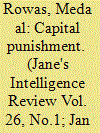| Srl | Item |
| 1 |
ID:
093417


|
|
|
| 2 |
ID:
129426


|
|
|
| 3 |
ID:
178233


|
|
|
|
|
| Summary/Abstract |
After almost 25 years of what could justifiably be called transformative change in South Africa, a truism is that the country’s new legal order, established by the Constitution in 1993 and 1996, provides the critical foundation of peace and security upon which its freedom has been built. The Constitutional Court was one of the most important of the new democratic institutions in the shaping of the country’s position as a constitutional democracy, upholding the values for which millions of people, black and white, had fought. This article is a brief reflection on the role of the Court in establishing the meaning of this democracy and giving it effect. The main goal of the article is to understand how the Court’s new jurisprudence works in particular contexts, how its work is related to crime and punishment, and what it means for the rights of marginalised groups in society. Using the examples of the Court’s decision in Makwanyane on the death penalty, and the Court’s decision on the findings of the Public Protector’s report on Nkandla, the article finds that the Court’s new jurisprudence takes quite a different view of legal developments in South Africa, insofar as the jurisprudence entrusts broad discretion to the Court and emphasises the need for sustained leadership of the Court to advance the battle for fundamental human rights, the rule of law, and democratic accountability.
|
|
|
|
|
|
|
|
|
|
|
|
|
|
|
|
| 4 |
ID:
086300


|
|
|
|
|
| Publication |
2008.
|
| Summary/Abstract |
This article investigates the way in which the Council of Europe enforced the norm against capital punishment in Europe. The Council of Europe, through both moral persuasion and centripetal pressure, compelled its member states to adopt the regionally promoted human rights standard. Ukraine, where the very last execution in Europe took place, accepted the norm after a number of years of resistance and in the face of public opposition to abolition. It was possible because of the adamant role of the Council of Europe in attempting to build a death penalty-free zone in Europe and Ukraine's strategic will to be integrated within the European regional community.
|
|
|
|
|
|
|
|
|
|
|
|
|
|
|
|
| 5 |
ID:
117520


|
|
|
|
|
| Publication |
2012.
|
| Summary/Abstract |
On the eve of World War II, eight countries had completely abolished the death penalty and another six had banned it for ordinary crimes. As of early 2008, 92 countries had prohibited capital punishment for all crimes and 10 more had ruled it out for ordinary crimes. The goal of this article is to account for the pattern of national abolition of the death penalty since 1960. We hypothesize that certain kinds of democracies are more liable to end capital punishment than others. Specifically, the negotiated form of democracy produced by parliamentary systems with proportional representation ("consensus democracy" in Lijphart's terms) is more likely to do away with the death penalty than are other forms of democracy. As previous research indicates, democratic transitions also increase the likelihood of abolition. Finally, international influences can also tip countries toward abolition. We suggest that incentives provided by international organizations, particularly in Europe, have drawn some countries toward abolition. The empirical analysis of approximately 150 countries for the period 1960-2005 confirms our expectations.
|
|
|
|
|
|
|
|
|
|
|
|
|
|
|
|
| 6 |
ID:
044639


|
|
|
|
|
| Publication |
London, The Penguin press, 1987.
|
| Description |
192p.
|
| Standard Number |
0-713-99008-2
|
|
|
|
|
|
|
|
|
|
|
|
Copies: C:1/I:0,R:0,Q:0
Circulation
| Accession# | Call# | Current Location | Status | Policy | Location |
| 031563 | 303.625/ARA 031563 | Main | Withdrawn | General | |
|
|
|
|